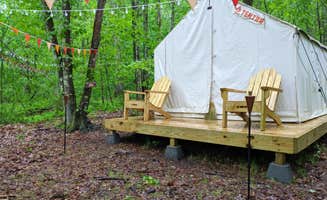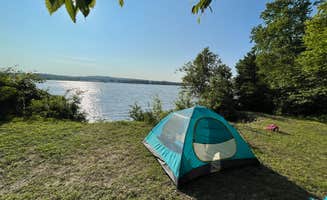Tent campsites near West Greenwich, Rhode Island typically operate during late spring through early fall when temperatures range from 50-85°F. The area sits within the Arcadia Management Area, Rhode Island's largest recreational space spanning over 14,000 acres of woodland. Most dispersed camping locations require advance permits through the Rhode Island Department of Environmental Management, with campsites generally available from early May through late October.
What to do
Kayaking and canoeing: Selden Neck State Park Campground offers water-based adventures on the Connecticut River. Campers must paddle approximately 20 minutes across the river to reach this island campground. One visitor noted, "It's about a 20 minute paddle across the river to the island. If it's a nice day, you're going to encounter some wake from passing boats so make sure your gear is in waterproof bags."
Swimming in undeveloped areas: Buck Hill Campground provides swimming access in Wakefield Pond without lifeguards or developed beach facilities. The natural setting offers several entry points to the water.
Fishing from shore: Several campgrounds provide fishing opportunities, particularly during early morning and evening hours when fish are most active. Water's Edge Campground in Coventry offers shoreline access for anglers within a 15-minute drive from West Greenwich.
What campers like
Privacy in wooded sites: Chapman Pond Preserve provides secluded camping with minimal development. A camper reports, "Good tent platforms, picnic tables and outhouse. CT river within view. Good site."
Unobstructed river views: Waterfront camping locations provide scenery without modern intrusions. One camper at Gillette Castle State Park Campground shared, "We have camped on the south end of Hurd Park several times via boat access. It is amazing with the views of the CT River and being able to watch the sunrise and sunset."
Group-friendly layouts: Many tent campsites near West Greenwich feature clustered camping areas rather than individual sites. At Buck Hill Campground, "All the sites are in large clusters (each can accommodate 10+ tents). many of the sites are also along Wakefield Pond."
What you should know
Limited facilities: Most tent campsites require self-sufficiency. Water's Edge Campground provides more amenities than most with showers and toilets, while others like Arcadia Backpack Camping Area have no drinking water or sanitation facilities.
Water access considerations: Selden Neck State Park Campground requires proper planning for weather conditions. One camper advised, "In the morning, we were completely socked in with fog which would have been an issue if we had to get back early. But it burned off before long and we headed back."
Reservation requirements: Many sites require advance bookings through Rhode Island DEM. LeGrand Reynolds Horsemen's Camping Area in the Arcadia Management Area and several others list as reservation-required but have limited online reservation systems.
Tips for camping with families
Look for sites with gradual water entry: Finding safe swimming locations matters for families with children. Buck Hill Campground has "a small somewhat sandy area that perhaps used to be a beach of sorts, though no lifeguards or anything. The water is clean and fine for swimming with a few areas that make for easy entry."
Reserve adjacent sites for privacy: Gillette Castle State Park Campground offers clustered sites that work well for family groups. A visitor suggested, "There's a few sites close to each other, so it is nice to go with enough people to occupy them all at once to keep it personal."
Pack extra water containers: Since most West Greenwich area campsites lack drinking water, families should bring 1-2 gallons per person per day, with additional capacity for dish washing and personal hygiene.
Tips from RVers
Limited electrical access: Most tent campsites near West Greenwich that allow RVs have minimal hookups. At Buck Hill Campground, "A few of the clusters have a covered patio area with electricity," but most sites have no power available.
Consider alternatives to campfires: Several campgrounds like Frontier Family Camper Park restrict open fires completely, requiring propane stoves for cooking. Always verify current fire restrictions before arrival as regulations change seasonally based on conditions.



